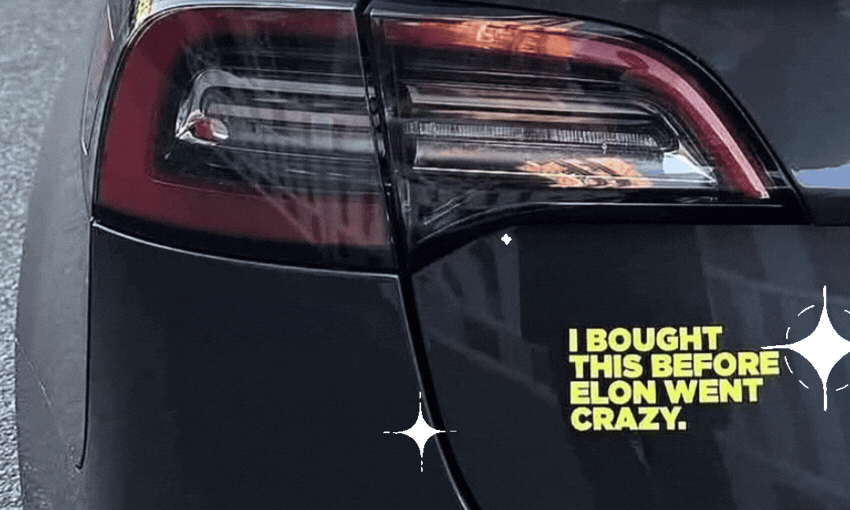As Elon Musk becomes an increasingly powerful figure in Trump’s America, some Tesla owners in Aotearoa are finding ways to distance themselves from the brand with which he’s synonymous. Will it save them from being targeted?
There’s a single fresh sticker on Sam’s rear bumper. The Auckland EV owner stuck it on his 2021 Tesla just this week after it arrived in the mail. About the size of a hand, the sticker’s wavy black text reads “Anti Elon Tesla Club”.
The popularity of these types of stickers is booming – they took off in the US after last November’s presidential election returned Donald Trump to power and turned his good buddy, Tesla CEO Elon Musk, already the world’s richest person, into one of the most powerful people in US politics. In Germany, one retailer is selling 2,000 a day and international giants Temu and Aliexpress have jumped on the trend too. There are slogans like “I bought this before I knew Elon was crazy”, “Shut up Elon” and “Elon ate my cat”.
Those are the ones stuck on by owners – there’s also a legion of activists armed with “swasticar” stickers, some understood to be operating in Wellington. In the US, stickers are just the beginning. In Colorado, a woman threw Smirnoff Ice bottle molotov cocktails at a dealership and nationwide protests are escalating.
When Sam bought his Tesla Model 3 in 2021, people were excited by it. Back then there weren’t so many around and strangers asked him for rides. “People were like ‘this is the future, and this is really cool.’” Sam wanted an EV for environmental reasons, and he went for a Tesla because they were, quite simply, the best option on the market for him at the time – high performance, great battery, nice to drive and heaps of features. “I always thought Elon was a bit weird,” says Sam, “but I didn’t really know too much or think it would be a problem.”
There are another 8,687 registered Tesla Model 3s and 9,066 Model Ys on Aotearoa’s roads, making Tesla the most popular EV brand in the country. But some of their owners, like Sam, are experiencing buyer’s remorse. “I don’t really want to be driving around in something that’s literally associated with a fascist,” says Sam.
“For a long time everything was just peachy,” says Matthew, another Tesla owner in Aotearoa. Elon Musk was an early investor in Tesla and became its CEO in 2008. Many people, Matthew among them, saw him as “gifted” and “brilliant” even if he “lacked any social tact”. Musk was considered a a humanitarian and a technological pioneer keen to solve climate change. Over the past few years the quirky tech disruptor has become increasingly political and polarising. Buying Twitter in 2022 over purported free speech concerns and rebranding it as X, he has steadily moved towards the radical right, vowing last year to “destroy the woke mind virus”.
This politicisation has come to a head in his support of Donald Trump and now, his position as an adviser in the White House. Musk has real influence in government, particularly through his brainchild, the Department of Government Efficiency (DOGE). DOGE is gutting the federal bureaucracy by firing thousands of employees. Matthew is not simply disappointed by this. He is “furious”, and he’s not the only one.
Protests in the US are escalating and there are calls for a Tesla boycott. Molotov cocktails are being thrown into Tesla lots. Cars are being shot at. A nationwide “Tesla takedown” on Saturday resulted in six arrests. Some protesters are arriving at the protests in their Teslas with “expletives” written on them. Charging stations have been lit on fire. Meanwhile, in Wellington, “Fuck off fascist” has been repeatedly spray-painted on signage at the Tesla dealership, and in Auckland, a “spray paint pest” has been arrested for targeting Teslas (and, in an apparent case of mistaken identity, one non-Tesla EV) parked on central suburb streets.
Media in the US and Europe are connecting anti-Musk sentiment with plummeting Tesla sales and share values. Here in New Zealand, it has been reported that Tesla’s most popular car, Model Y, saw an 80% drop in sales last year. In January and February that model slipped from its top spot to the third position, behind the Polestar 2 and the BYD Atto 3. Commentators here paint a complicated picture. Sales for all EVs have dropped following the repeal of the clean car discount in December 2023 and the application of road user charges to EVs in April 2024. It’s also possible that people are holding out until the updated Tesla Model Y, Juniper, arrives in April.
Sam thinks the Musk situation “doesn’t really affect that many people wanting to buy a new car”. Instead, it’s the existing owners – “lefty people who care about the environment, and who generally are not transphobes” – who find themselves in a catch 22. EVs don’t usually have great resale value, and that’s dropped even lower with the recent policy changes. While Sam would not buy a Tesla now (not even secondhand), selling it does not seem financially viable. He would have to massively downgrade, and at the end of the day, the money has gone to Tesla already. “It is still the nicest car I’ve ever owned. It’s lovely to drive, it’s fast, it’s quiet, it’s comfortable, it’s great for road trips. I’m still using it just the same,” he says.
Jane, once a “classic petrol head”, feels similarly about her family’s Model Y that they bought in 2023. It fits the dog and the kids and its drivechain has got only 17 moving parts, compared to 200 or so in a typical combustion engine. Best of all, Jane charges it almost exclusively from the solar panels on the roof of her house, so it costs nothing to run. It’s all very “practical” and that appeals to the two heads of the household – an accountant and an engineer. But Musk is a bugbear. Jane studied history, focusing on national socialism in German politics, and she is finding some of Musk’s behaviour “quite concerning”. One thing that really upset her was his disavowal of his trans daughter. Jane’s nephew is trans, so the move hit home. “We’re quite passionate about caring for our transgender family member,” she says.
Still, there are no plans to sell the car. When Jane commented on a social media post about the graffiti on the Wellington Tesla dealership, saying that although she does not support Musk, the people who work there are “very lovely and don’t deserve this”, she was confronted by people saying she should sell her car. But the environmental reasons for buying it in the first place still stand, she says. “I’m not giving Elon any more money by using it. If I sell it he’s not getting less money. The best thing I can do is just run it into the ground and not ever buy another one.”
It’s not the first time the car has been a “political hot potato” for Jane. Her father worked in gas exploration his whole life and when Jane and her partner first bought the EV, “Oh my god, you should have heard the shit I got.” In her rural farming community, “we took quite a lot of flak”, she adds, and she knows that the clean car discount they took advantage of was seen by some as a tax break for the rich. “It did always cause a bit of a hoo-ha.”
But this year, Jane has had two new experiences in her Tesla. Two weeks ago, she was driving behind an old Honda. All of a sudden the passengers were throwing rubbish out of the car at her. She was shaken when she got home, because it seemed dangerous. When she told her husband, he wondered if it was because she was driving a Tesla. Earlier in the year, she came back to her car in a public carpark to discover some “quite serious body panel damage” on the passenger door. It’s hard to say whether it was an accident.
Sam has seen many vandalised Teslas online, and it’s part of the reason for getting his new sticker. “I don’t want people to think that I support Elon Musk, and I don’t want them to damage my car.” It may not save him: it’s worth noting that of the three Teslas spray-painted in Auckland this week, one had a sticker reading, “We bought this car before Elon Musk went crazy”. So far Sam hasn’t had any issues, apart from getting “shit” from friends. Though he feels uneasy about his car, the sticker provides enough of a solution for now.
Matthew is trying to find a way to remove the Tesla logos from his car. Not to replace them and try to pass the car off as another brand as has been happening overseas, but to disavow the brand. He has divested his Tesla shares and instead invested into the Chinese multinational BYD. You’re likely to find him at dealerships, looking out for a replacement car.
While Sam, Matthew and Jane are keen to distance themselves from Musk, there are just as many, if not more, Tesla owners who feel otherwise. New Zealand’s EV owners have an active community page on Facebook, and discussions on the topic there are heated. The opinions range from those who have sold their Tesla cars because of Musk, to people who say the man and the car must be thought of separately, some who don’t care about politics and a very small number who appear to support Musk.
There could be one perfect solution for Tesla owners unhappy with their increasingly hot potato. “My dearest wish would be that he disinvests from the company,” says Matthew. If Musk was no longer the CEO, both Sam and Jane think they would buy Teslas again. Getting rid of Musk would require a vote of no-confidence from shareholders, who are limited to voting once a year. In the June 2024 meeting, most voted in line with what the board (Musk) wanted. Matthew is not holding out much hope that that will change – “Hell has not frozen over yet,” he says.

